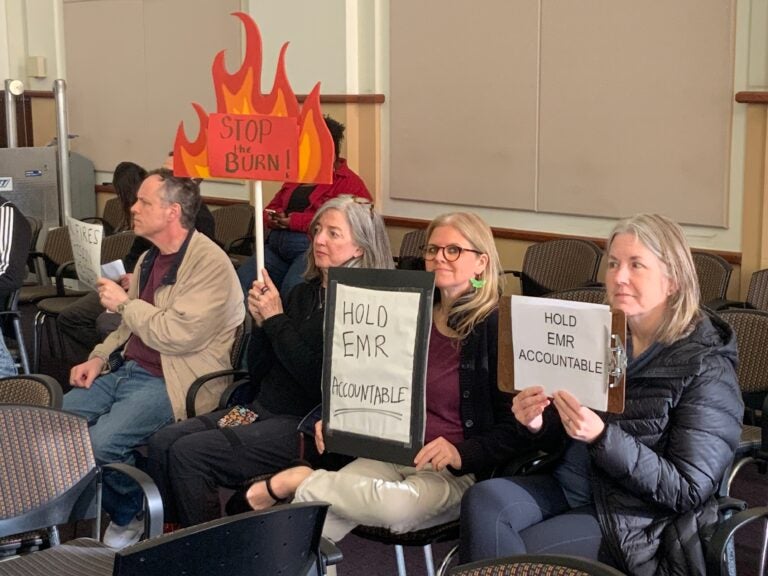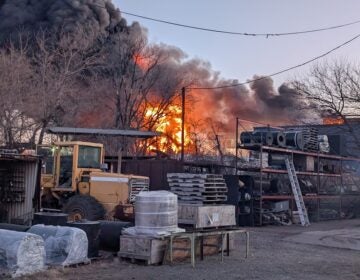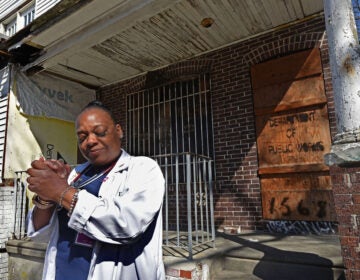Camden City Council approves regulating lithium-ion batteries after massive EMR fire
EMR says lithium-ion batteries at their scrapyard caused a four-alarm blaze. Residents are skeptical it will hold the yard operator accountable.

Some Camden residents at the City Council meeting on April 8, 2025, holding signs calling for scrapyard operator EMR to be held accountable for a four-alarm fire in South Camden that happened in February. (P. Kenneth Burns/WHYY)
From Camden and Cherry Hill to Trenton and the Jersey Shore, what about life in New Jersey do you want WHYY News to cover? Let us know.
The Camden City Council approved an ordinance Tuesday evening that regulates the handling of lithium-ion batteries. Its passage comes nearly two months after a massive fire at EMR, a recycling complex in South Camden. “The storage or disposal of lithium-ion batteries” was blamed for the blaze.
Under the ordinance, reconditioned batteries must be certified by “Underwriters Laboratories or other approved and certified organizations.” Batteries for a powered mobility device, such as a scooter, cannot be stored in a multifamily unit for recharging unless it has been approved by the fire department. This is also applicable to mobility devices with a self-contained battery. The new law dictates proper disposal locations for the batteries.
Those who violate the new ordinance will be subject to the general penalties within Camden’s city code: a fine of up to $2,000, up to 90 days in jail or community service for up to 90 days.
The ordinance was proposed by Council Vice President Arthur Barclay, who declined to comment on this story.
Residents and community members who spoke on the bill during the public comment section of the council meeting were critical that the bill did not address complaints about the EMR metal recycling complex.
The Feb. 22 fire caused 100 residents to evacuate their homes. The scrapyard has a history of violations, according to the New Jersey Department of Environmental Protection. EMR blamed the fire on lithium-ion batteries that were wrongly delivered to the facility and called for more regulation of these batteries.
An incident report from the Camden Fire Department, obtained by WHYY News, indicates the fire was made worse by EMR employees who moved burning material to other piles and onto a conveyor belt that led into a building.
Residents seeking a change after the fire brought their demands and complaints about EMR to the council meeting. They were skeptical that the bill would hold the scrapyard company accountable for the fire.
“Something like this should have been passed in 2021-2022 when we had to first evacuate our homes from a fire that they immediately blamed on these lithium batteries,” said Kristin Schrun, who lives within a five-minute walk from the scrapyard.
She said the ordinance was “a Band-Aid” that was “fine enough,” adding that she has witnessed every fire at the scrapyard and has had to evacuate her with her kids three different times.
“I have to avoid conversations with my mom about the fires so she doesn’t ask me again why I live where I do,” she said. “I live there because I love my neighbors, I love the city, but I do not love what EMR is doing to us.”
Jon Compton, executive director of the Center for Environmental Transformation, which is based near the scrapyard, said he could not see how the ordinance will hold EMR accountable or force them to improve their operations to make their neighbors safe.
“They already do not accept lithium-ion batteries,” he said. “They have not faced significant fines. They have not had their operations curtailed in a meaningful way.”
Frank Santos, who is part of a community coalition that encouraged people to address the council, told City Council they were helping EMR “build a narrative around lithium-ion batteries.”
“Blaming these batteries for being the main problem behind these consistent fires is like the chef blaming the stove for burning the food,” he said.
Vincent Basara, Camden city spokesman, said the ordinance is a step in the right direction.
“There is still more work to do on this issue, but the city remains committed to working with the state and all involved to make improvements,” he said. “The municipalities generally have limited powers, and those powers to regulate are largely derived from the state.”

Get daily updates from WHYY News!
WHYY is your source for fact-based, in-depth journalism and information. As a nonprofit organization, we rely on financial support from readers like you. Please give today.







